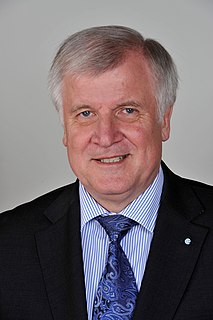A Quote by Annegret Kramp-Karrenbauer
We will look at the entire immigration question from the protection of outer borders through the asylum procedures to integration, in particular its efficacy.
Related Quotes
There is no quick fix for illegal immigration. But only when we achieve better control of our borders and better respect for our immigration laws can we give meaning to the discussion we need to have over reforming the numbers, categories, and procedures for legal immigration into the United States.
The immigration bill - the new immigration bill - [Bill Clinton] has stripped the courts, which Congress can do under the leadership of the president, so that people who had a right to asylum or to petition - for asylum who were legal residents are now unable to go through because that part of the bill has been taken out.
Our borders are much too porous...We want to keep them open, but we also have to be much more careful. ...Right now, if you get on an airplane [to the U.S.] and claim asylum...when you arrive at Kennedy Airport in New York, they will say to you, 'OK, we'll give you a hearing on whether you deserve asylum. Show up in a year.' And two-thirds of the people never show up.
For people who must fear for their lives because of their religion or political convictions, the protection provided by Article 16a of the German constitution, the right to asylum, applies. Nobody is questioning that. Irrespective of that, there is immigration that must be regulated, to bring skilled personnel to Germany, for example. We have to establish criteria for that. Their affiliation with the Christian-Western culture should be one of them.
This leads to a question - if a great many people are for a certain project, is it necessarily right? If the vast majority is for it, is it even more certainly right? This, to be sure, is one of the tricky points of democracy. The minority often turns out to be right, and though one believes in the efficacy of the democratic process, one has also to recognize that the demand of the many for a particular project at a particular time may mean only disaster.
A question has to be asked: if you are a genuine asylum seeker, why have you not sought asylum in the first safe country that you arrived in? Because France is not a country where anyone would argue it is not safe in any way whatsoever, and if you are genuine, then why not seek asylum in your first safe country?

































